#how to make crm software
Explore tagged Tumblr posts
Text
Top five crm software compared with table
CRM software is an essential tool for businesses of all sizes to manage customer relationships and improve sales. With so many options available, it can be challenging to choose the right CRM software for your business. In this article, we will compare the top five CRM software options to help you make an informed decision.
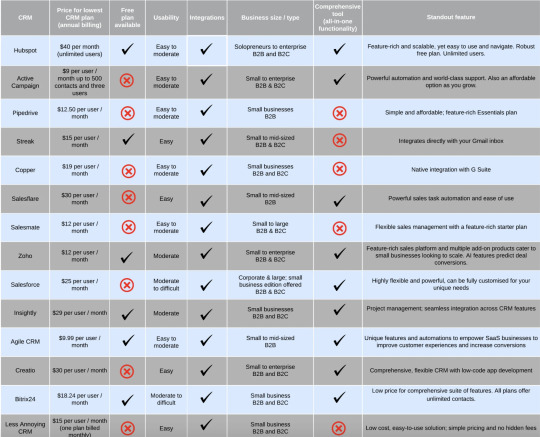
1. HubSpot CRM
HubSpot CRM is a popular CRM software that offers a range of features to help businesses manage their customer relationships. It is a free CRM solution that is easy to use and offers a range of integrations with other business tools. HubSpot CRM is best suited for small to medium-sized businesses.
Pros
HubSpot CRM is a free solution that offers a range of features to help businesses manage their customer relationships.
It is easy to use and offers a range of integrations with other business tools.
HubSpot CRM offers a range of marketing and sales tools to help businesses improve their sales and marketing efforts.
It offers a user-friendly interface that makes it easy to navigate and find the tools you need.
Cons
HubSpot CRM may not be the best option for larger businesses that need more advanced features and tools.
Some users may find the free version to be limited in terms of features and functionality.
2. Salesforce
Salesforce is one of the most popular CRM software options available. It is a cloud-based solution that offers a range of features and tools to help businesses manage their customer relationships. Salesforce is best suited for medium to large-sized businesses.
Pros
Salesforce offers a range of features and tools to help businesses manage their customer relationships.
It is a cloud-based solution that can be accessed from anywhere.
Salesforce offers a range of integrations with other business tools.
It offers a user-friendly interface that makes it easy to navigate and find the tools you need.
Cons
Salesforce can be expensive, especially for smaller businesses.
Some users may find the interface to be overwhelming at first, as there are many features and tools to explore.
3. Freshsales
Freshsales is a comprehensive and smart solution to discover leads and boost engagement. It is a cloud-based solution that offers a range of features and tools to help businesses manage their customer relationships. Freshsales is best suited for small to medium-sized businesses.
Pros
Freshsales offers a range of features and tools to help businesses manage their customer relationships.
It is a cloud-based solution that can be accessed from anywhere.
Freshsales offers a range of integrations with other business tools.
It offers a user-friendly interface that makes it easy to navigate and find the tools you need.
Cons
Freshsales may not be the best option for larger businesses that need more advanced features and tools.
Some users may find the pricing to be expensive, especially for smaller businesses.
4. Zoho CRM
Zoho CRM is a classic full-stack CRM that helps businesses of all sizes work and scale. It is a cloud-based solution that offers a range of features and tools to help businesses manage their customer relationships. Zoho CRM is best suited for small to medium-sized businesses.
Pros
Zoho CRM offers a range of features and tools to help businesses manage their customer relationships.
It is a cloud-based solution that can be accessed from anywhere.
Zoho CRM offers a range of integrations with other business tools.
It offers a user-friendly interface that makes it easy to navigate and find the tools you need.
Cons
Zoho CRM may not be the best option for larger businesses that need more advanced features and tools.
Some users may find the interface to be overwhelming at first, as there are many features and tools to explore.
5. Less Annoying CRM
Less Annoying CRM is a simple CRM built just for small businesses and their teams. It is a cloud-based solution that offers a range of features and tools to help businesses manage their customer relationships. Less Annoying CRM is best suited for small businesses.
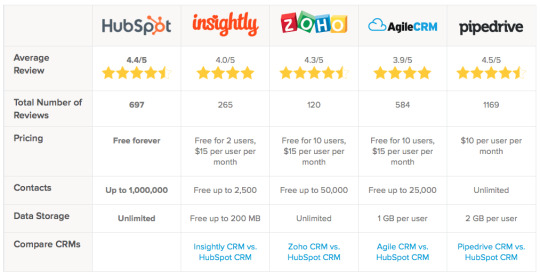
Pros
Less Annoying CRM is a simple and easy-to-use solution that is built just for small businesses.
It is a cloud-based solution that can be accessed from anywhere.
Less Annoying CRM offers a range of integrations with other business tools.
It offers a user-friendly interface that makes it easy to navigate and find the tools you need.
Cons
Less Annoying CRM may not be the best option for larger businesses that need more advanced features and tools.
Some users may find the pricing to be expensive, especially for smaller businesses.
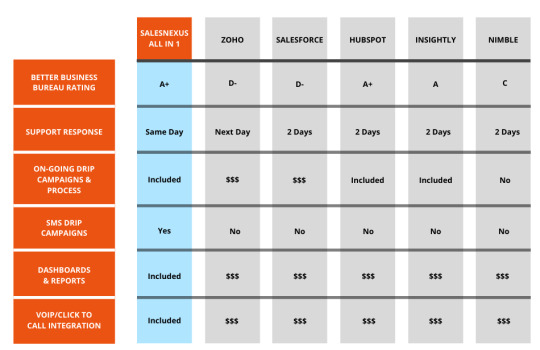
In conclusion, these five CRM software options offer a range of features and tools to help businesses manage their customer relationships. HubSpot CRM is a free solution that is best suited for small to medium-sized businesses. Salesforce, Freshsales, and Zoho CRM are cloud-based solutions that offer a range of features and tools to help businesses manage their customer relationships. Less Annoying CRM is a simple and easy-to-use solution that is built just for small businesses. By comparing these five CRM software options, you can choose the one that best fits your business needs.
#crm software#software crm#10 best crm software#software crm system#how to make crm software#what is the best crm software#how to use crm software#is crm a software#famous crm software#how to sell crm software#what does crm software stand for#does google have a crm software#does google have crm software#what is crm software stand for#what does crm software mean#how much does crm software cost#what does crm stand for in software#what does crm software do#what crm software does#what is crm software used for#what are the best crm software#which crm software is best#how to learn crm software#what is the most commonly used crm software right now#what are crm software#what are some popular crm software#what features should a crm have#what are the types of crm software#how crm software works#how much is crm software
0 notes
Text
What are the next steps after obtaining an insurance broker license, and how can you generate potential leads using Mzapp CRM software?
Congratulations on securing your insurance broker license! The journey doesn’t end here; it’s just the beginning of building a successful insurance brokerage. Here’s how you can proceed and leverage Mzapp CRM software to find potential leads:
Steps After Getting Your Insurance Broker License
Understand Your Market: Research your target audience (individuals, businesses, or specific sectors).
Develop a Business Plan: Set goals for client acquisition, revenue, and operational processes.
Build a Network: Partner with insurance providers and attend industry events to establish your presence.
Create an Online Presence: Build a professional website and maintain active profiles on social platforms.
Offer Value-Added Services: Educate customers on policies, claims management, and risk assessments.
Using Mzapp CRM Software to Generate Leads
Lead Capture: Utilize Mzapp’s integrated forms and web tracking tools to capture inquiries from your website or social media.
Automated Follow-Ups: Set up personalized email and SMS follow-ups to nurture leads effectively.
Lead Scoring: Prioritize leads based on their interaction history, ensuring you focus on high-potential prospects.
Data-Driven Campaigns: Use analytics to identify what works and launch targeted campaigns.
Seamless Policy Management: Impress leads by showcasing how smoothly you manage policies and claims through Mzapp.
Why Choose Mzapp CRM?
Mzapp CRM simplifies lead management, streamlines operations, and provides insights into customer behavior, making it easier to convert prospects into loyal clients.
Learn more about how Mzapp can transform your insurance business here.
#Question:#What are the next steps after obtaining an insurance broker license#and how can you generate potential leads using Mzapp CRM software?#Answer:#Congratulations on securing your insurance broker license! The journey doesn’t end here; it’s just the beginning of building a successful i#Steps After Getting Your Insurance Broker License#Understand Your Market: Research your target audience (individuals#businesses#or specific sectors).#Develop a Business Plan: Set goals for client acquisition#revenue#and operational processes.#Build a Network: Partner with insurance providers and attend industry events to establish your presence.#Create an Online Presence: Build a professional website and maintain active profiles on social platforms.#Offer Value-Added Services: Educate customers on policies#claims management#and risk assessments.#Using Mzapp CRM Software to Generate Leads#Lead Capture: Utilize Mzapp’s integrated forms and web tracking tools to capture inquiries from your website or social media.#Automated Follow-Ups: Set up personalized email and SMS follow-ups to nurture leads effectively.#Lead Scoring: Prioritize leads based on their interaction history#ensuring you focus on high-potential prospects.#Data-Driven Campaigns: Use analytics to identify what works and launch targeted campaigns.#Seamless Policy Management: Impress leads by showcasing how smoothly you manage policies and claims through Mzapp.#Why Choose Mzapp CRM?#Mzapp CRM simplifies lead management#streamlines operations#and provides insights into customer behavior#making it easier to convert prospects into loyal clients.#Learn more about how Mzapp can transform your insurance business here.
1 note
·
View note
Text
AI Agent Development: How to Create Intelligent Virtual Assistants for Business Success
In today's digital landscape, businesses are increasingly turning to AI-powered virtual assistants to streamline operations, enhance customer service, and boost productivity. AI agent development is at the forefront of this transformation, enabling companies to create intelligent, responsive, and highly efficient virtual assistants. In this blog, we will explore how to develop AI agents and leverage them for business success.

Understanding AI Agents and Virtual Assistants
AI agents, or intelligent virtual assistants, are software programs that use artificial intelligence, machine learning, and natural language processing (NLP) to interact with users, automate tasks, and make decisions. These agents can be deployed across various platforms, including websites, mobile apps, and messaging applications, to improve customer engagement and operational efficiency.
Key Features of AI Agents
Natural Language Processing (NLP): Enables the assistant to understand and process human language.
Machine Learning (ML): Allows the assistant to improve over time based on user interactions.
Conversational AI: Facilitates human-like interactions.
Task Automation: Handles repetitive tasks like answering FAQs, scheduling appointments, and processing orders.
Integration Capabilities: Connects with CRM, ERP, and other business tools for seamless operations.
Steps to Develop an AI Virtual Assistant
1. Define Business Objectives
Before developing an AI agent, it is crucial to identify the business goals it will serve. Whether it's improving customer support, automating sales inquiries, or handling HR tasks, a well-defined purpose ensures the assistant aligns with organizational needs.
2. Choose the Right AI Technologies
Selecting the right technology stack is essential for building a powerful AI agent. Key technologies include:
NLP frameworks: OpenAI's GPT, Google's Dialogflow, or Rasa.
Machine Learning Platforms: TensorFlow, PyTorch, or Scikit-learn.
Speech Recognition: Amazon Lex, IBM Watson, or Microsoft Azure Speech.
Cloud Services: AWS, Google Cloud, or Microsoft Azure.
3. Design the Conversation Flow
A well-structured conversation flow is crucial for user experience. Define intents (what the user wants) and responses to ensure the AI assistant provides accurate and helpful information. Tools like chatbot builders or decision trees help streamline this process.
4. Train the AI Model
Training an AI assistant involves feeding it with relevant datasets to improve accuracy. This may include:
Supervised Learning: Using labeled datasets for training.
Reinforcement Learning: Allowing the assistant to learn from interactions.
Continuous Learning: Updating models based on user feedback and new data.
5. Test and Optimize
Before deployment, rigorous testing is essential to refine the AI assistant's performance. Conduct:
User Testing: To evaluate usability and responsiveness.
A/B Testing: To compare different versions for effectiveness.
Performance Analysis: To measure speed, accuracy, and reliability.
6. Deploy and Monitor
Once the AI assistant is live, continuous monitoring and optimization are necessary to enhance user experience. Use analytics to track interactions, identify issues, and implement improvements over time.
Benefits of AI Virtual Assistants for Businesses
1. Enhanced Customer Service
AI-powered virtual assistants provide 24/7 support, instantly responding to customer queries and reducing response times.
2. Increased Efficiency
By automating repetitive tasks, businesses can save time and resources, allowing employees to focus on higher-value tasks.
3. Cost Savings
AI assistants reduce the need for large customer support teams, leading to significant cost reductions.
4. Scalability
Unlike human agents, AI assistants can handle multiple conversations simultaneously, making them highly scalable solutions.
5. Data-Driven Insights
AI assistants gather valuable data on customer behavior and preferences, enabling businesses to make informed decisions.
Future Trends in AI Agent Development
1. Hyper-Personalization
AI assistants will leverage deep learning to offer more personalized interactions based on user history and preferences.
2. Voice and Multimodal AI
The integration of voice recognition and visual processing will make AI assistants more interactive and intuitive.
3. Emotional AI
Advancements in AI will enable virtual assistants to detect and respond to human emotions for more empathetic interactions.
4. Autonomous AI Agents
Future AI agents will not only respond to queries but also proactively assist users by predicting their needs and taking independent actions.
Conclusion
AI agent development is transforming the way businesses interact with customers and streamline operations. By leveraging cutting-edge AI technologies, companies can create intelligent virtual assistants that enhance efficiency, reduce costs, and drive business success. As AI continues to evolve, embracing AI-powered assistants will be essential for staying competitive in the digital era.
4 notes
·
View notes
Text
How to Choose the Best ERP for Engineering and Manufacturing Industry
In today’s fast-paced world, engineering and manufacturing companies face increasing pressure to deliver high-quality products while maintaining efficiency and cost-effectiveness. Implementing the right Enterprise Resource Planning (ERP) software can significantly enhance operations, streamline workflows, and boost productivity. However, with numerous options available, selecting the best ERP software for the engineering and manufacturing industry can be challenging. This guide will help you navigate this decision-making process and choose the most suitable solution for your business.

Why ERP is Crucial for Engineering and Manufacturing
ERP software integrates various business processes, including production, inventory management, supply chain, finance, and human resources. For engineering and manufacturing companies, ERP solutions are particularly vital because they:
Facilitate real-time data sharing across departments.
Enhance supply chain management.
Optimize production planning and scheduling.
Ensure compliance with industry standards.
Reduce operational costs.
Partnering with the right Engineering ERP software company ensures that your organization leverages these benefits to stay competitive in a dynamic market.
Steps to Choose the Best ERP for Engineering and Manufacturing
1. Understand Your Business Needs
Before exploring ERP solutions, evaluate your company’s specific requirements. Identify the pain points in your current processes and prioritize the features you need in an ERP system. Common features for engineering and manufacturing companies include:
Bill of Materials (BOM) management
Production planning and scheduling
Inventory control
Quality management
Financial reporting
Consulting with a reputed ERP software company can help you match your needs with the right features.
2. Look for Industry-Specific Solutions
Generic ERP software might not address the unique needs of the engineering and manufacturing sector. Opt for an ERP software in India that offers modules tailored to your industry. Such solutions are designed to handle specific challenges like multi-level BOM, project costing, and shop floor management.
3. Check Vendor Expertise
Choosing a reliable vendor is as important as selecting the software itself. Research ERP solution providers with a strong track record in serving engineering and manufacturing companies. Look for reviews, case studies, and client testimonials to gauge their expertise.
4. Evaluate Scalability and Flexibility
Your business will grow, and so will your operational requirements. Ensure that the ERP system you choose is scalable and flexible enough to accommodate future needs. The top 10 ERP software providers in India offer scalable solutions that can adapt to changing business demands.
5. Assess Integration Capabilities
An ERP system must integrate seamlessly with your existing tools, such as Computer-Aided Design (CAD) software, Customer Relationship Management (CRM) systems, and IoT devices. A well-integrated system reduces redundancies and enhances efficiency.
6. Prioritize User-Friendliness
A complex system with a steep learning curve can hinder adoption. Choose an ERP software with an intuitive interface and easy navigation. This ensures that your employees can use the system effectively without extensive training.
7. Consider Customization Options
No two businesses are alike. While standard ERP solutions offer core functionalities, some companies require customization to align with specific workflows. A trusted ERP software company in India can provide custom modules tailored to your unique needs.
8. Focus on Data Security
Engineering and manufacturing companies often deal with sensitive data. Ensure that the ERP solution complies with the latest security standards and offers robust data protection features.
9. Compare Pricing and ROI
While cost is an important factor, it should not be the sole criterion. Evaluate the long-term return on investment (ROI) offered by different ERP software. A slightly expensive but feature-rich solution from the best ERP software provider in India may deliver better value than a cheaper alternative with limited functionalities.
10. Test Before You Commit
Most ERP software companies offer free trials or demo versions. Use these opportunities to test the software in a real-world scenario. Gather feedback from your team and ensure the solution meets your expectations before finalizing your decision.
Benefits of Partnering with the Best ERP Software Providers in India
India is home to some of the leading ERP software providers in India, offering state-of-the-art solutions for the engineering and manufacturing sector. Partnering with a reputable provider ensures:
Access to advanced features tailored to your industry.
Reliable customer support.
Comprehensive training and implementation services.
Regular updates and enhancements to the software.
Companies like Shantitechnology (STERP) specialize in delivering cutting-edge ERP solutions that cater specifically to engineering and manufacturing businesses. With years of expertise, they rank among the top 10 ERP software providers in India, ensuring seamless integration and exceptional performance.
Conclusion
Selecting the right ERP software is a critical decision that can impact your company’s efficiency, productivity, and profitability. By understanding your requirements, researching vendors, and prioritizing features like scalability, integration, and security, you can find the perfect ERP solution for your engineering or manufacturing business.
If you are looking for a trusted ERP software company in India, consider partnering with a provider like STERP. As one of the best ERP software providers in India, STERP offers comprehensive solutions tailored to the unique needs of engineering and manufacturing companies. With their expertise, you can streamline your operations, improve decision-making, and stay ahead in a competitive market.
Get in touch with STERP – the leading Engineering ERP software company – to transform your business with a reliable and efficient ERP system. Take the first step toward a smarter, more connected future today!
#Manufacturing ERP software company#ERP solution provider#Engineering ERP software company#ERP software company#ERP software companies
4 notes
·
View notes
Text
Mastering B2B Sales: Your Essential Guide to 20 Proven Strategies and Tactics for 2025

The B2B sales landscape is transforming rapidly, driven by advancements in technology, changing buyer behavior, and heightened competition. As businesses gear up for 2025, the focus must shift to a more strategic, data-driven, and customer-centric approach to achieve sustainable growth. Below, we delve into 20 essential strategies and tactics that every B2B company should adopt to refine their sales processes and thrive in the ever-evolving market.
1. Personalized Customer Engagement
In today’s competitive environment, personalization is no longer optional—it’s essential. Tailor your messaging to address specific customer pain points and needs. Use CRM platforms to track interactions, preferences, and behavioral data, ensuring every touchpoint feels meaningful and relevant.
2. Adopt AI and Automation
Artificial intelligence and automation tools are transforming how B2B sales teams operate. From chatbots handling initial inquiries to AI-driven analytics predicting customer needs, these technologies streamline workflows, improve efficiency, and help prioritize leads for better conversion rates.
3. Focus on B2B Lead Generation in India
With India’s growing economy and increasing demand for B2B services, it’s a hotspot for lead generation. Companies like The Global Associates specialize in capturing high-quality leads in this region, enabling businesses to tap into one of the world’s fastest-growing markets. Invest in localized marketing campaigns, and utilize platforms like LinkedIn and Google Ads to target decision-makers effectively.
4. Implement Account-Based Marketing (ABM)
ABM is a powerful strategy where marketing and sales teams work collaboratively to target high-value accounts. Instead of casting a wide net, focus your resources on a select group of prospects, delivering customized campaigns that directly address their specific needs.

5. Enhance Your Digital Presence
Your online presence is often the first impression potential clients have of your business. Ensure your website is optimized for SEO, mobile-friendly, and offers a seamless user experience. Regularly update blogs, whitepapers, and case studies that demonstrate your expertise and add value to your audience.
6. Develop Multi-Channel Outreach
Gone are the days when email alone could drive sales. Today’s B2B buyers expect communication across multiple channels, including email, phone, social media, and even in-person meetings. A well-coordinated outreach strategy ensures you’re reaching prospects wherever they are most active.
7. Invest in Value-Driven Content
Content is the backbone of B2B marketing. Create in-depth whitepapers, blogs, videos, and case studies that address the challenges your prospects face. Use content as a tool to educate and build trust, positioning your business as a thought leader in your industry.
8. Strengthen Sales Enablement
Empower your sales team with the tools, resources, and training they need to succeed. This includes access to up-to-date product information, buyer personas, and data-driven insights that can help them tailor their pitch to individual prospects.
9. Leverage Data Analytics
Incorporate data-driven insights into every stage of your sales funnel. Use analytics tools to track customer behavior, identify trends, and refine your strategies. This approach ensures you’re always making informed decisions that drive results.
10. Collaborate with Strategic Partners
Partnering with complementary businesses can open doors to new opportunities. For instance, a software provider could partner with a consulting firm to offer bundled services, creating value for both companies and their customers.
11. Focus on Customer Retention
It’s often said that retaining a customer is more cost-effective than acquiring a new one. Implement loyalty programs, provide excellent post-sale support, and continuously engage with your existing customers to ensure they remain loyal advocates for your brand.
12. Harness the Power of Video Marketing
Video content is increasingly becoming a preferred medium for B2B buyers. Use explainer videos, product demos, and client testimonials to engage prospects and communicate your value proposition effectively.
13. Encourage Referrals
Happy customers can become your best brand ambassadors. Develop a referral program that incentivizes your existing clients to recommend your services to their network.
14. Monitor Competitors
Keeping a close eye on your competitors can provide valuable insights. Identify what’s working for them and where they might be falling short. Use this information to refine your strategies and gain a competitive edge.

15. Expand Internationally
If your business hasn’t explored international markets yet, 2025 might be the year to do so. Develop localized strategies to address the specific needs and cultural preferences of global audiences.
16. Use Social Proof to Build Credibility
Social proof, such as client testimonials, success stories, and case studies, plays a crucial role in establishing trust. Showcase these prominently on your website and marketing materials to demonstrate your capabilities.
17. Align Sales and Marketing Teams
Silos between sales and marketing teams can hinder your growth. Align their goals and encourage collaboration to create a seamless journey from lead generation to conversion.
18. Host Webinars and Events
Webinars and events are excellent ways to educate your audience, showcase your expertise, and generate new leads. Offer valuable insights during these sessions to leave a lasting impression on your prospects.
19. Optimize Pricing Strategies
Your pricing strategy should cater to different customer segments. Offer tiered packages, volume discounts, or subscription models to accommodate varying budgets and requirements.
20. Partner with Industry Experts
Collaborate with B2B sales and lead generation experts like The Global Associates. With a proven track record of delivering high-quality leads and helping businesses achieve their sales goals, partnering with such firms ensures your strategy is backed by experience and expertise.
Final Thoughts
The future of B2B sales lies in leveraging technology, focusing on customer-centric strategies, and optimizing lead generation efforts in emerging markets like India. By adopting these 20 essential tactics, businesses can stay ahead of the curve, driving both growth and profitability in 2025.
Would you like a tailored approach to integrate these strategies into your business? Collaborate with The Global Associates to unlock the full potential of your B2B sales strategy.
#b2b#b2b lead generation#lead generation#the global associates#b2b lead generation services#lead generation services in india
3 notes
·
View notes
Text
The Future of Customer Relationship Management: Why Your Business Needs a Cutting-Edge CRM System
Introduction
In today’s fast-paced business environment, the importance of customer relationship management (CRM) cannot be overstated. As companies strive to build lasting relationships with their customers, embracing a cutting-edge CRM system is no longer a luxury; it's a necessity. The future of customer relationship management promises exciting developments and innovative approaches that can elevate businesses to new heights. In this article, we’ll delve deep into why your business needs a top-tier CRM system and how it can transform your approach to managing customer relationships.
The Future of Customer Relationship Management: Why Your Business Needs a Cutting-Edge CRM System
A robust CRM system has evolved from merely being a tool for storing customer data. Today, it serves as an integrated platform that enhances communication, streamlines processes, and ultimately drives sales performance. But what does the future hold for CRM systems?
1. Understanding CRM Systems 1.1 What Is a CRM System?
At its core, a CRM system is software designed to manage interactions with current and potential customers. CRM system It helps businesses streamline processes by gathering customer information across various channels—like email, social media, and phone calls—into one comprehensive database.
1.2 Types of CRM Systems
There are three main types of CRM systems:
Operational CRM: Focuses on automating business processes such as sales automation and marketing automation. Analytical CRM: Analyzes customer data to improve decision-making. Collaborative CRM: Facilitates communication between different departments within an organization. 2. The Evolution of Customer Relationship Management 2.1 Historical Perspective
Understanding the evolution of CRM helps contextualize its current state and future trajectory. Early methods relied heavily on manual processes and paper-based records.
2.2 Technological Advancements
With the advent of the internet and cloud computing, the landscape shifted dramatically in the late 1990s, leading to more sophisticated solutions that enable real-time data analysis.
3. The Importance of a Cutting-Edge CRM System 3.1 Enhancing Customer Experience
Customers today expect personalized experiences tailored to their preferences. A cutting-edge CRM system allows businesses to offer just that by analyzing past interactions and predicting future needs.
3.2 Boosting Sales Efficiency
By automating repetitive tasks like lead scoring and follow-ups, sales teams can focus on closing deals rather than administrative work.
4. Key Features of Modern CRM Systems 4.1 Cloud-Based Solutions
Cloud technology offers flexibility and accessibility, enabling team members to access customer data from anywhere at any time.
4.2 AI Integration
Artificial Intelligence (AI) is revolutionizing how businesses interact with customers by providing insights derived from massive datasets.
5. Data Security in Customer Relationship Management
2 notes
·
View notes
Text
How to Choose the Best CRM Tool for Your Small Business?
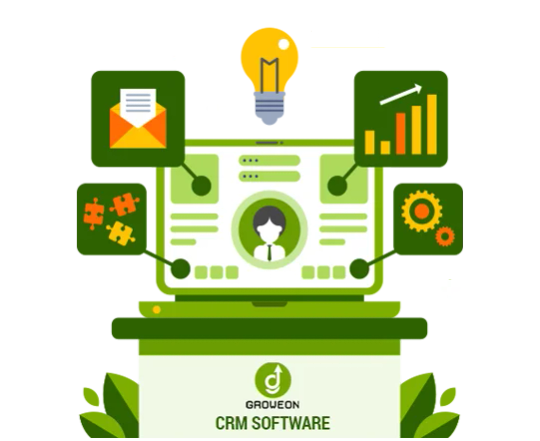
One out of five small businesses fail within the first year. No, this is not to demotivate you but to show you the reality of how important the first five years of a small business are. Most small businesses struggle to deal with customers as customers have different needs, and managing all your different customers feels next to impossible; that’s why you need CRM software.
Customer relationship management (CRM) software has revolutionised the way businesses interact with customers. It helps reduce the need for manual input by automating key processes like tracking customer interactions, managing leads, and organising sales pipelines. CRM software is proven to increase business productivity and efficiency and improve overall customer satisfaction.
Before you put your skates on and look for a CRM tool, it is crucial to choose a CRM tool that is perfect for your business, as the internet is flooded with tons of CRM software. Here are the key factors to consider when selecting the best CRM tool for your small business.
1. Identify Your Business Needs
Before diving into the technical details of various CRM tools, it’s important to clearly identify your business’s unique needs. Ask yourself questions like:
- What are your current pain points in customer management?
- Are you looking to streamline sales, marketing, or customer service processes?
- How many people will be using the CRM system?
Once you understand your specific goals, choosing CRM software will be quite easy for you as you can prioritise what features the software must have.
2. User-Friendly Interface
As a small business, you most likely won’t have a tech-savvy and highly experienced team, so it is crucial to choose CRM software with a user-friendly interface. A simple and user-friendly interface will allow your team to quickly adapt and use the software efficiently. Look for a CRM that offers an intuitive dashboard, easy navigation, and simple data entry processes.
Additionally, many CRM tools offer free trials, so take advantage of this to assess whether the platform is easy for your team to use and navigate.
3. Affordability
Most small businesses don’t have massive profits and income-generating revenues, so it is crucial not to get overexcited and choose CRM software that suits your budget. CRM software with more features and capabilities will cost more, so it is vital to understand your business needs and opt for a CRM that doesn’t break the bank and gets the job done. Groweon CRM software is quite affordable and has tons of features, so it is a great choice for small businesses.
4. Scalability
As your business grows, your CRM should be able to grow with you. Look for a CRM solution that offers scalable features so that you don’t outgrow the tool as your customer base expands. A scalable CRM will allow you to add new users, customise workflows, and integrate additional tools without disruption.
Choosing a CRM that can scale alongside your business will save you the hassle of transitioning to a new platform as your needs evolve.
5. Mobile Accessibility
In today’s fast-paced business environment, having access to your CRM data on the go is essential. Mobile accessibility enables you to update and access customer information, track sales, and communicate with your team from anywhere. This is particularly useful for small business owners or sales teams who spend a significant amount of time out of the office.
Ensure that the CRM tool you choose offers a robust mobile application that is easy to use and provides the same level of functionality as its desktop version.
6. Customer Support
Reliable customer support is crucial, especially when you’re first implementing a CRM system. Small businesses often lack the in-house expertise to troubleshoot technical issues, so having access to a responsive support team can make a significant difference.
Look for CRM providers that offer 24/7 customer support, training resources, and user communities. Some CRM tools even offer dedicated account managers for small businesses, ensuring that you get personalised help whenever needed.
Conclusion
Choosing the best CRM tool for your small business can make a world of difference to your business’s operations and massively improve productivity. No matter what industry you are in, ideal CRM software can transform the way you manage customers.
2 notes
·
View notes
Text
How Custom Software Development Can Improve Your Customer Experience
In today's highly competitive market, delivering an exceptional customer experience is crucial for businesses striving to stand out. One of the most effective ways to enhance customer satisfaction is through custom software development. Whether you're a small business or a large enterprise, tailored software solutions can significantly impact your customer interactions and overall business efficiency.
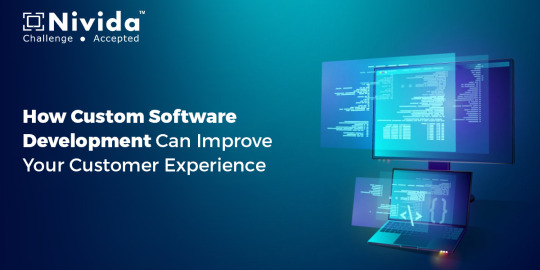
Why Custom Software Development?
Custom software development is the process of designing, creating, deploying, and maintaining software for a specific set of users, functions, or organizations. Unlike off-the-shelf software, custom solutions are built to meet the unique needs of a business, ensuring that every feature and function aligns perfectly with the company's goals and customer expectations.
For businesses in India, particularly those partnering with a software development company in Gujarat, custom software development offers numerous advantages. Let's explore how it can improve your customer experience.
1. Personalized User Experience
One of the primary benefits of custom software is its ability to deliver a personalized experience to your customers. By understanding your customers' needs, a custom software development company in India can create solutions that provide a seamless and intuitive user interface. This personalized approach not only makes it easier for customers to navigate your services but also increases their satisfaction and loyalty.
2. Enhanced Efficiency and Speed
Custom software is designed to integrate smoothly with your existing systems, eliminating the inefficiencies that often come with using multiple off-the-shelf solutions. This streamlined process results in faster service delivery, which is crucial for keeping customers happy in a world where time is of the essence. Working with a software development company in Gujarat ensures that your software is optimized for speed and efficiency, providing your customers with quick and reliable service.
3. Scalability and Flexibility
As your business grows, so do your customer needs. Off-the-shelf software may not always accommodate this growth, leading to a decrease in service quality. Custom software, however, is built with scalability in mind. A software development company in Gujarat can develop a solution that grows with your business, allowing you to continually meet and exceed customer expectations.
4. Improved Data Security
In the age of digital transformation, data security is a top concern for customers. Custom software development allows you to implement robust security measures tailored to your business's specific needs. A custom software development company in India can ensure that your software is built with the latest security protocols, safeguarding your customers' data and building their trust in your brand.
5. Better Customer Support
Custom software can be equipped with advanced customer support features, such as AI-driven chatbots, real-time analytics, and integrated CRM systems. These tools enable you to provide immediate assistance and proactive support to your customers, enhancing their overall experience. By partnering with a software development company in Gujarat, you can ensure that your software includes the latest technologies to support and delight your customers.
6. Cost-Effectiveness in the Long Run
While the initial investment in custom software development may be higher than purchasing off-the-shelf solutions, the long-term benefits are substantial. Custom software reduces the need for multiple applications, minimizes downtime, and decreases the likelihood of costly security breaches. Over time, this leads to significant cost savings, which can be reinvested into further improving your customer experience.
Conclusion
In today's fast-paced digital world, businesses must continuously innovate to meet the evolving demands of their customers. Custom software development offers a powerful way to enhance customer experience, from personalized interfaces to improved security and support. By partnering with a reputable software development company in Gujarat or any leading custom software development company in India, you can create software solutions that not only meet but exceed your customers' expectations, setting your business apart in a competitive market.
Investing in custom software is investing in your customers' satisfaction and your business's future. Make the choice today and watch your customer experience reach new heights.
4 notes
·
View notes
Text
E-commerce Marketing Automation Streamlining Your Online Sales Strategy

If you want your e-commerce strategies to run more smoothly automation tools are essential. It is challenging to provide each customer with the ideal incentive for purchase or to provide personalized offers to each one in real-time.
But you can do that with the assistance of an automated workflow. You can significantly increase your conversion rates by engaging visitors at the right times. You want to optimize each site visit and set up workflows for marketing automation.
However, you can increase conversion rates without spending a lot of time on manual tasks by establishing straightforward marketing automation processes.
How many people visit your website each day? An e-commerce site with an average conversion rate of 2.3% will unavoidably lose 97.7% of its visitors.
Fundamentals of E-commerce Marketing Automation
Marketing automation is virtually necessary in the realm of online retail. As a result, this technology can help to improve the customer experience and thus is critical for successful e-commerce strategies.
Defining Marketing Automation
Essentially, marketing automation is exactly what it sounds like using a software platform to automate menial and repetitive war-room-level marketing-centric tasks. Such tasks are involved in email campaigns, social media posting and ad campaigns. Creating this system will enable us to quickly establish a connection with our audience as required.
This technology saves time but it also helps ensure our messaging is more consistent across all touchpoints. Meaning we can segment our audience automatically and create personalized experiences depending on what they do. Which in turn provides better engagement and higher customer satisfaction.
Benefits of Automating E-commerce Marketing
When we can automate our e-commerce marketing efforts the benefits are enormous. The first thing is by saving time on manual tasks we can optimize the use of our resources. We can concentrate on the important and strategic work.
Second, automation has helped me improve customer relations. With personalized communication and offers informed by customer behavior can make the shopping experience more personal. Therefore, this leads to higher conversion rates and more customer loyalty often.
Lastly, using automation tools for data analytics gives us many useful insights. We use these insights to understand performance, refine campaigns and make informed decisions on how can improve your marketing efforts.
Key Components in E-commerce Marketing Automation
There are multiple important parts we need to consider in e-commerce marketing automation. Mainly these are the automation tools. They include email marketing platforms to customer relationship management (CRM) systems.
After that we need to consider customer segmentation This allows us to segment our audience into more targeted groups by interest or buying behavior. This will also allow us to customize our marketing messages for each group accordingly.
Finally, the importance of analytics. The data we get through our automated processes will need to be parsed and analyzed before the successful measurement of our campaigns. Armed with this information. We refine our strategies to enhance future marketing efforts that will ultimately drive further growth and more engagement.
Signification of Marketing Automation
Automation tools have become crucial to survival because consumers expect more personalized interactions than ever. This way, we get automatic answers depending on user behavior so that our messages are sent to the right people at the appropriate time. It greatly assists with lead nurturing and closing sales.
#ecommerce#marketing#automation#artificial intelligence#entrepreneur#digitaltransformation#saas#software#innovation#business#digital marketing#connection#artists on tumblr
2 notes
·
View notes
Text
Java's Lasting Impact: A Deep Dive into Its Wide Range of Applications
Java programming stands as a towering pillar in the world of software development, known for its versatility, robustness, and extensive range of applications. Since its inception, Java has played a pivotal role in shaping the technology landscape. In this comprehensive guide, we will delve into the multifaceted world of Java programming, examining its wide-ranging applications, discussing its significance, and highlighting how ACTE Technologies can be your guiding light in mastering this dynamic language.

The Versatility of Java Programming:
Java programming is synonymous with adaptability. It's a language that transcends boundaries and finds applications across diverse domains. Here are some of the key areas where Java's versatility shines:
1. Web Development: Java has long been a favorite choice for web developers. Robust and scalable, it powers dynamic web applications, allowing developers to create interactive and feature-rich websites. Java-based web frameworks like Spring and JavaServer Faces (JSF) simplify the development of complex web applications.
2. Mobile App Development: The most widely used mobile operating system in the world, Android, mainly relies on Java for app development. Java's "write once, run anywhere" capability makes it an ideal choice for creating Android applications that run seamlessly on a wide range of devices.
3. Desktop Applications: Java's Swing and JavaFX libraries enable developers to craft cross-platform desktop applications with sophisticated graphical user interfaces (GUIs). This cross-platform compatibility ensures that your applications work on Windows, macOS, and Linux.
4. Enterprise Software: Java's strengths in scalability, security, and performance make it a preferred choice for developing enterprise-level applications. Customer Relationship Management (CRM) systems, Enterprise Resource Planning (ERP) software, and supply chain management solutions often rely on Java to deliver reliability and efficiency.
5. Game Development: Java isn't limited to business applications; it's also a contender in the world of gaming. Game developers use Java, along with libraries like LibGDX, to create both 2D and 3D games. The language's versatility allows game developers to target various platforms.
6. Big Data and Analytics: Java plays a significant role in the big data ecosystem. Popular frameworks like Apache Hadoop and Apache Spark utilize Java for processing and analyzing massive datasets. Its performance capabilities make it a natural fit for data-intensive tasks.
7. Internet of Things (IoT): Java's ability to run on embedded devices positions it well for IoT development. It is used to build applications for smart homes, wearable devices, and industrial automation systems, connecting the physical world to the digital realm.
8. Scientific and Research Applications: In scientific computing and research projects, Java's performance and libraries for data analysis make it a valuable tool. Researchers leverage Java to process and analyze data, simulate complex systems, and conduct experiments.
9. Cloud Computing: Java is a popular choice for building cloud-native applications and microservices. It is compatible with cloud platforms such as AWS, Azure, and Google Cloud, making it integral to cloud computing's growth.

Why Java Programming Matters:
Java programming's enduring significance in the tech industry can be attributed to several compelling reasons:
Platform Independence: Java's "write once, run anywhere" philosophy allows code to be executed on different platforms without modification. This portability enhances its versatility and cost-effectiveness.
Strong Ecosystem: Java boasts a rich ecosystem of libraries, frameworks, and tools that expedite development and provide solutions to a wide range of challenges. Developers can leverage these resources to streamline their projects.
Security: Java places a strong emphasis on security. Features like sandboxing and automatic memory management enhance the language's security profile, making it a reliable choice for building secure applications.
Community Support: Java enjoys the support of a vibrant and dedicated community of developers. This community actively contributes to its growth, ensuring that Java remains relevant, up-to-date, and in line with industry trends.
Job Opportunities: Proficiency in Java programming opens doors to a myriad of job opportunities in software development. It's a skill that is in high demand, making it a valuable asset in the tech job market.
Java programming is a dynamic and versatile language that finds applications in web and mobile development, enterprise software, IoT, big data, cloud computing, and much more. Its enduring relevance and the multitude of opportunities it offers in the tech industry make it a valuable asset in a developer's toolkit.
As you embark on your journey to master Java programming, consider ACTE Technologies as your trusted partner. Their comprehensive training programs, expert guidance, and hands-on experiences will equip you with the skills and knowledge needed to excel in the world of Java development.
Unlock the full potential of Java programming and propel your career to new heights with ACTE Technologies. Whether you're a novice or an experienced developer, there's always more to discover in the world of Java. Start your training journey today and be at the forefront of innovation and technology with Java programming.
8 notes
·
View notes
Text
Why Tour Operators Love helloGTX Travel CRM
Tour operators need effective solutions in today's fast-paced travel business to improve customer experiences, streamline operations, and stay ahead of the competition. GTX Travel CRM meets that need. It is a comprehensive travel software solution developed by Catabatic Technology customized to the unique requirements of travel businesses. We'll look into GTX's popularity among tour operators in this blog post, along with how it can completely change the way you run your travel agency.
1. Streamlined Operations
With Travel CRM, tour operators can streamline their day-to-day operations, from managing bookings and itineraries to handling customer inquiries and payments. The platform's intuitive interface and automation features make it easy to manage all aspects of your business from a single dashboard.
2. Enhanced Customer Experiences
GTX allows tour operators to provide personalized experiences to their customers, from customized itineraries to real-time updates and notifications. By understanding your customers' preferences and behavior, you can create tailored travel experiences that exceed their expectations.
3. Integrated Booking System
helloGTX Travel CRM Software comes with an integrated booking system that allows tour operators to manage bookings, reservations, and inventory in real time. Whether you're offering guided tours, hotel accommodations, or transportation services, it makes it easy to manage all aspects of your business from one platform.
4. Advanced Reporting and Analytics
With GTX's advanced reporting and analytics tools, tour operators can gain valuable insights into their business performance, customer behavior, and market trends. By analyzing this data, you can make informed decisions and optimize your operations for maximum efficiency and profitability.
5. Mobile Accessibility
It is fully mobile-responsive, allowing tour operators to manage their business on the go. Whether you're in the office, on the road, or out in the field, GTX offers a mobile app that anyone can access from any device with an internet connection, ensuring that you're always connected to your business.
6. Dedicated Customer Support
It provides dedicated customer support to help tour operators get the most out of the platform. Whether you need technical assistance, training, or advice on best practices, our team of experts is here to help you every step of the way.
Conclusion
In a competitive and rapidly evolving industry, tour operators need a reliable and efficient software solution to stay ahead of the curve. With Travel CRM, tour operators can streamline their operations, enhance customer experiences, and grow their business like never before. Discover why tour operators love helloGTX and revolutionize the way you manage your travel business today.
Call to Action
Ready to take your travel business to the next level? Schedule a demo and see how it can transform your operations, enhance customer experiences, and drive business growth.
Schedule a Demo Now
#travel software#best travel crm#best crm for small business#b2b travel software#crm company#crm development#travel crm with api#Travel CRM software#GTX travel CRM#helloGTX Travel CRM Software#travel agent in delhi#b2b travel agency
2 notes
·
View notes
Text
Salon Management Software: The Key to Streamlining Your Salon Business
Salon management software has emerged as a game-changer, revolutionizing the way salons operate. This blog will delve into the essentials of salon management and explore the transformative role of salon POS software in streamlining business operations.

I. Understanding Salon Management:
Salon management involves overseeing the various aspects of a salon business, from appointment scheduling and inventory management to employee scheduling and customer relationship management. The goal is to create a seamless experience for both clients and salon staff.
II. The Importance of Salon Management Software:
Appointment Scheduling:
Efficiently manage appointments, reduce no-shows, and optimize staff schedules with the help of salon management software. Clients can book appointments online, and staff can access real-time schedules, enhancing overall workflow.
Inventory Management:
Keep track of products, manage stock levels, and streamline the ordering process. Salon management software helps avoid product shortages, reducing the risk of missed sales opportunities.
Customer Relationship Management (CRM):
Build lasting relationships with clients by utilizing CRM features. Personalized client profiles, appointment history, and automated reminders contribute to enhanced customer satisfaction and loyalty.
III. Salon POS Software: A Closer Look:
What is Salon POS Software?
Salon POS software, or Point of Sale software, is a specialized system designed to handle transactions and streamline the sales process in a salon. It combines the functionality of a cash register with advanced features tailored to the unique needs of the beauty industry.
Key Features of Salon POS Software:
Transaction Processing:
Facilitate quick and secure transactions, including cash, credit cards, and digital payments, providing convenience for both clients and staff.
Inventory Integration:
Seamlessly integrate with salon management software to ensure real-time updates on product availability and sales data.
Appointment Management:
Sync with the appointment scheduling system to unify the booking and payment processes, reducing wait times and enhancing the overall client experience.
Reporting and Analytics:
Generate comprehensive reports on sales, popular services, and inventory turnover, enabling informed decision-making for business growth.
IV. How Salon POS Software Streamlines Your Business:
Efficient Transactions:
Salon POS software speeds up the checkout process, minimizing waiting times and enhancing the overall customer experience.
Accurate Inventory Management:
Real-time updates on inventory levels and sales data help salon owners make informed decisions, preventing overstock or shortages.
Integrated Systems:
The seamless integration of salon POS software with management tools ensures a synchronized and efficient operation, reducing manual errors and increasing productivity.
Conclusion:
Salon management software, coupled with a robust POS system, is undeniably the key to streamlining your salon business. From optimizing appointments to managing inventory and enhancing customer relationships, these tools empower salon owners to focus on what they do best – providing exceptional beauty services while ensuring a smooth and efficient operation. Embrace the technological revolution in the beauty industry and watch your salon thrive.
#salon pos software#salon billing software#best salon software for small business#salon software in india#salon management software
2 notes
·
View notes
Text
In today's competitive business world, managing customer relationships is essential for success. This is where CRM software comes in, but with so many options available, how do you choose the right one for your small business? Our comprehensive guide covers everything you need to know, including the different types of CRM software, popular options for small businesses, and factors to consider when making your decision. https://www.aiospark.com/choosing-the-right-crm-software-for-your-small-business/?feed_id=397&_unique_id=65d1a6c4bc80a&utm_source=Tumblr&utm_medium=donavichi&utm_campaign=AIO_Bot #Marketing #65d1a6c4c06fc
2 notes
·
View notes
Text
Streamlining Manufacturing Operations with Production ERP Software
In the rapidly evolving world of manufacturing, small and medium enterprises (SMEs) face growing competition, shifting customer demands, and the need for seamless operations. Engineering manufacturing companies, in particular, must juggle a multitude of processes, including production planning, inventory management, and regulatory compliance. As a result, more and more businesses are recognizing the importance of adopting advanced technological solutions to remain competitive. This is where ERP (Enterprise Resource Planning) software becomes essential.
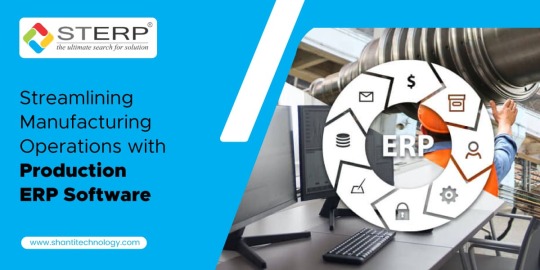
ERP software streamlines and integrates core business processes, enabling better decision-making, enhanced efficiency, and improved profitability. For engineering and manufacturing SMEs in India, finding the right ERP solution is critical to long-term success.
In this blog, we will explore why ERP software is a necessity for small and medium-sized engineering manufacturing companies and how choosing the right solution can significantly impact their operations. We will also highlight some of the top providers of manufacturing ERP software in India and discuss the key factors to consider when selecting the best ERP software for your business.
Why SMEs Need ERP Software in Manufacturing
Engineering and manufacturing businesses operate in complex environments where efficiency, precision, and cost-effectiveness are paramount. Managing resources, ensuring timely production, maintaining product quality, and adhering to industry regulations are all crucial components of the business. An ERP system integrates all these processes into a unified platform, enabling businesses to operate more smoothly and efficiently.
ERP software for manufacturing companies in India is designed to streamline various aspects of business operations, including supply chain management, production scheduling, finance, procurement, inventory control, and customer relationship management (CRM). By providing real-time data and insights, ERP software enables companies to optimize operations, reduce costs, and improve customer satisfaction.
The benefits of ERP systems for engineering and manufacturing companies include:
Improved Efficiency: ERP software automates manual processes, reducing human error and increasing overall operational efficiency.
Cost Savings: Optimized resource management, reduced wastage, and better production planning help reduce operating costs.
Better Decision-Making: Real-time data from various departments allows for more informed and timely decisions.
Enhanced Collaboration: ERP software integrates different departments, promoting better communication and collaboration across the organization.
Scalability: ERP systems are designed to scale as your business grows, making them ideal for SMEs looking to expand in the future.
Features of the Best ERP Software for Manufacturing Companies
Not all ERP software is the same, and engineering manufacturing companies have specific needs that must be addressed. To select the right solution, businesses should consider the key features of manufacturing ERP software in India.
Production Management: This is a core feature of any manufacturing ERP system, allowing businesses to plan and schedule production processes effectively. It includes functions such as job scheduling, capacity planning, and work order management.
Inventory Management: Efficient inventory control is essential in manufacturing. ERP systems help manage inventory levels, track materials, and ensure that stock levels meet demand without causing overstocking or stockouts.
Supply Chain Management: Manufacturing companies often rely on complex supply chains to ensure timely procurement and delivery of materials. The best ERP for manufacturing industry will have robust supply chain management capabilities, including vendor management, procurement, and logistics tracking.
Quality Control: Ensuring product quality is critical in manufacturing. ERP systems help enforce quality checks at different stages of production, ensuring products meet industry standards and regulatory requirements.
Financial Management: An integrated ERP system enables businesses to manage accounting, budgeting, and financial reporting more efficiently. This ensures better visibility into cash flow, profit margins, and overall financial health.
CRM Integration: Managing customer relationships is crucial for manufacturing companies. ERP software integrates CRM functions to manage leads, track customer interactions, and improve customer satisfaction.
Compliance and Reporting: Compliance with industry standards and regulations is critical in engineering and manufacturing. The best ERP software for manufacturing companies in India includes features that help businesses stay compliant and generate necessary reports for regulatory authorities.
How to Choose the Best ERP for Manufacturing Industry
Selecting the best ERP for your engineering manufacturing business is a critical decision that can significantly impact your operations. Here are some key factors to consider when evaluating ERP solutions:
Customization: Every manufacturing business is unique, and ERP software should be customizable to meet specific business needs. The best ERP software provider in India will offer solutions that can be tailored to your company’s requirements.
Ease of Use: The usability of ERP software is crucial, especially for small and medium-sized businesses. A system that is easy to use and requires minimal training will ensure that employees can adopt the software quickly.
Scalability: Your ERP system should be able to grow with your business. As your company expands, the system should be able to handle additional users, processes, and data without compromising performance.
Integration: ERP software should integrate seamlessly with other systems and tools that your business uses, such as CAD software, financial systems, and supply chain management tools.
Vendor Support: Choose an ERP provider that offers ongoing support, training, and updates. This ensures that your business can continue to operate smoothly even as the software evolves.
Reputation: Consider the reputation of the ERP provider. Some of the top 10 ERP software providers in India are known for their reliability, customer support, and industry expertise. Researching these providers can help you identify the best ERP solution for your business.
Top ERP Software Providers in India
India has a growing number of ERP solution providers, catering to the specific needs of manufacturing companies. Some of the best ERP software providers in India offer solutions that are designed to meet the challenges faced by engineering manufacturing businesses. Here are some of the top 10 ERP software providers in India known for their expertise in the manufacturing industry:
SAP Business One: A global leader in ERP software, SAP offers a robust solution tailored for SMEs in the manufacturing sector. SAP Business One provides comprehensive tools for financial management, supply chain management, and production planning.
Oracle NetSuite: Oracle’s NetSuite ERP is a cloud-based solution that offers a suite of tools for manufacturing businesses, including inventory management, procurement, and financials. It is known for its scalability and ease of use.
TallyPrime: Tally is one of the most popular ERP solutions in India, especially among small businesses. TallyPrime offers inventory management, accounting, and compliance tools, making it a good option for SMEs.
Microsoft Dynamics 365: Microsoft’s ERP solution is designed to integrate seamlessly with other Microsoft products and offers a range of tools for financial management, production planning, and CRM.
STERP (Shanti Technology): Specializing in ERP software for the engineering and manufacturing industries, STERP provides customized solutions that cater to the specific needs of Indian businesses. Known as one of the best ERP software providers in India, STERP offers comprehensive ERP solutions tailored for SMEs.
Epicor ERP: Epicor is a global provider of manufacturing ERP software, offering a range of industry-specific solutions. Its software includes tools for production management, supply chain management, and quality control.
Infor CloudSuite Industrial (SyteLine): Infor’s CloudSuite Industrial is designed for manufacturing companies and offers a range of tools for managing production, supply chain, and finance.
Zoho ERP: Zoho provides a cloud-based ERP solution that is popular among small and medium-sized businesses in India. It offers tools for inventory management, accounting, and CRM.
Focus 9 ERP: Focus 9 is a comprehensive ERP solution designed for SMEs in the manufacturing sector. It offers tools for inventory control, production planning, and financial management.
Ramco ERP: Ramco offers cloud-based ERP software tailored for manufacturing businesses. It includes modules for production planning, quality control, and financial management.
Conclusion: Invest in the Best ERP for Manufacturing Success
For small and medium engineering manufacturing companies, investing in ERP software is crucial for optimizing operations, reducing costs, and staying competitive in a challenging market. With a wide range of ERP solutions available, businesses in India have access to some of the best ERP software providers in the world.
Choosing the right ERP for your business requires careful consideration of your specific needs, scalability requirements, and budget. By partnering with one of the top ERP software providers in India, such as STERP, SAP, or Oracle, you can ensure that your business is well-positioned for future growth and success.
#Best ERP software provider in India#Manufacturing ERP software in India#ERP for manufacturing company in India#Best ERP for manufacturing industry#Vadodara#Gujarat#Ahmedabad#Surat#Rajkot#Maharashtra#Mumbai#Pune#Bhopal#Indore#Madhyapradesh
4 notes
·
View notes
Text
How does LiveImpact's all-inclusive CRM solution enhance the impact of non-profit organizations? At LiveImpact, our mission is to empower and support non-profit organizations on their impactful journeys. We specialize in providing comprehensive CRM solutions, encompassing fundraising, event management, donor engagement, and case management. Our software is designed as an all-in-one solution, tailored to meet the unique needs of non-profits. We understand that your work is driven by passion and empathy, and our goal is to enhance your capabilities, streamline your operations, and ultimately enable you to make an even greater difference in the world.
5 notes
·
View notes
Text
Outsourced Call Center Services: Enhancing Customer Experience and Business Efficiency
In today's fast-paced business landscape, customer satisfaction and efficient operations are crucial for success. With the rise of globalization and technological advancements, many companies are turning to outsourced call center services as a means to achieve these goals. Outsourcing call center operations has become a popular strategy for businesses of all sizes, allowing them to focus on their core competencies while leveraging the expertise of specialized service providers. This article explores the benefits and considerations of outsourced call center services and how they contribute to enhancing customer experience and business efficiency.

Improved Customer Experience
One of the primary objectives of any business is to provide exceptional customer service. Outsourced call center services play a pivotal role in this regard by offering several advantages that contribute to an improved customer experience. First and foremost, call centers specialize in handling customer interactions, employing trained professionals who are skilled in communication and problem-solving. These agents are dedicated to resolving customer queries, addressing concerns, and providing personalized assistance. By outsourcing these services, businesses can tap into a pool of experienced professionals, ensuring that customers receive prompt and efficient support.
Additionally, outsourced call center services often operate on a 24/7 basis, allowing businesses to provide round-the-clock support to their customers. This flexibility is particularly valuable for organizations serving customers across different time zones or dealing with urgent inquiries. A well-managed outsourced call center can handle high call volumes, reducing wait times and ensuring that customers are promptly attended to. The availability of multilingual support further enhances the customer experience by enabling communication with a diverse customer base.
Cost Efficiency and Scalability
Outsourcing call center operations also offers cost advantages and scalability for businesses. Setting up an in-house call center requires significant investments in infrastructure, technology, recruitment, and training. By outsourcing these services, businesses can avoid these upfront expenses and instead opt for a predictable cost structure based on agreed-upon service levels. Outsourced call center providers are equipped with state-of-the-art technology, including advanced telephony systems, CRM software, and call analytics tools. These resources enable efficient call handling, data management, and performance monitoring, ensuring that businesses receive optimal value for their investment.
Furthermore, outsourcing call center services allows businesses to scale their operations rapidly and cost-effectively. During peak periods or business expansions, call volumes may surge, making it challenging for in-house teams to handle the increased workload. With an outsourced call center, businesses can easily scale up or down as needed, ensuring that customer service levels remain consistent. Service providers have the flexibility to allocate resources according to demand, ensuring that businesses never miss out on potential opportunities or risk losing customers due to long wait times or inadequate support.
Focus on Core Competencies
Outsourcing call center services allows businesses to concentrate on their core competencies and strategic initiatives. By offloading the responsibility of customer support to a specialized service provider, organizations can redirect their resources and energy towards activities that drive revenue and innovation. Outsourced call centers handle the day-to-day operations, allowing businesses to free up internal staff and management from mundane tasks, such as call handling and administrative duties. This newfound focus can lead to enhanced productivity, improved product development, and better overall business performance.
Considerations for Successful Outsourcing
While the benefits of outsourced call center services are evident, businesses must approach outsourcing with careful consideration. Choosing the right service provider is crucial to ensure a successful partnership. It is essential to evaluate the provider's industry experience, track record, technology capabilities, and cultural compatibility. Additionally, clear communication and collaboration between the business and the outsourced call center are vital for aligning goals, setting expectations, and maintaining transparency.
Data security and privacy are other critical considerations when outsourcing call center services. Businesses must ensure that the service provider adheres to strict data protection regulations and industry best practices. Confidential customer information should be handled securely, and robust protocols must be in place to prevent data breaches or unauthorized access.
Conclusion
Outsourced call center services offer businesses a competitive edge by providing enhanced customer experiences, cost efficiencies, scalability, and the opportunity to focus on core competencies. The strategic decision to outsource call center operations can enable businesses to streamline their customer support processes, achieve operational excellence, and ultimately drive growth. However, careful selection of a reliable and experienced service provider, coupled with effective communication and data security measures, is crucial for a successful outsourcing venture. By leveraging the expertise and resources of outsourced call center services, businesses can deliver exceptional customer service, increase customer loyalty, and stay ahead in today's highly competitive marketplace.
Click here to know more about our Services on Fiverr
Source:
#CallCenterSetup#CallCenterManagement#CustomerService#ContactCenter#CustomerExperience#Outsourcing#BusinessSolutions#CustomerSupport#ServiceManagement#InboundCallCenter#OutboundCallCenter#VirtualCallCenter#OmnichannelSupport#CRMIntegration#AgentTraining#EfficiencyImprovement#QualityAssurance#PerformanceMetrics#CostOptimization#TechnologyIntegration#WorkforceManagement#Analytics#ProcessImprovement#CustomerSatisfaction#ServiceLevelAgreement
7 notes
·
View notes